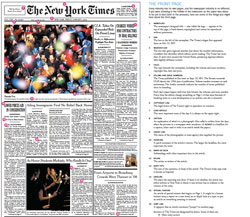Please note that this calendar is designed to be flexible: we may make changes along the way, depending on your interests and the needs of the class. Should you miss a class, you are responsible for knowing about—and adjusting for—any changes by getting notes and other materials from a classmate. Professional protocols and collegiality call for you to alert us if you’ll be missing on a day when we’re having a workshop or when you are scheduled to present materials.
|
|
|
| Thursday September 12th | In class: Introductions, key concepts, & course goals Due: Course Survey Preview:
|
 Week 2 Week 2Summary & Analysis St. Martin’s Handbook, Chapter 8 |
|
| Tuesday 9/17 |
In class: NYT as assigned — I’ll email instructions on Sunday
For class discussion, we’ll focus on p. A1 and the Sunday Review section — come prepared to discuss. St. Martin’s Handbook, 8 b-f |
 |
|
| Thursday 9/19 |
Due #1: post your revised initial, first summary in précis form, and keep both versions; we want to be able to see your original summary and the revised version, in précis form. Here’s one possible organizing principle for that. Due #2: Due: Rhetorical précis St. Martin’s 13b: ”Working with quotations”; note how some of the signal verbs are rhetorically active verbs (“claims”) and some are not (“says”). Can you tell the difference? Samples. |
 Week 3 Week 3Reading and writing rhetorically: ethos, pathos, & logos |
|
| Tuesday 9/24 |
Due: Rhetorical précis — Kristof, “The Boy Who Stood Up to Syrian Injustice” Reading: NYT, as assigned Sunday via email: In class: We will begin class by going around the room and hearing an informal 60-90 second overview of an interesting article that you read in the Sunday NYT — any section, any topic — why it was important and relevant to you, and why it should be important and relevant to us. It’s a great way to get a tour of the Sunday paper, and to find out what people are interested in. |
| Thursday 9/26 |
No Class Meeting: view Page One: Inside the New York Times Due: Rhetorical précis — your choice — any argument from the Op-Ed page from any daily edition this week. |
 Week 4 Week 4Planning and drafting a rhetorical analysis & individual conferences — schedule and sign-up TBA |
|
| Tuesday 10/1 |
Reading: NYT, as assigned — “Are We Hard Wired for War?” (Sunday Review, 12). And if you were keeping a file of NYT essays that seemed to you examples of writers engaged in truth-seeking behavior, would you include this one? Why? Why not? — “Hey ‘Starry Night,’ Say ‘Cheese!'” (Sunday Review, 5) — “Technology and the College Generation: Email Gets Failing Grades” (Style, 2) Due:
|
| Thursday 10/3 | In class: Writing Center Presentation; NYT, continued Peer Review Workshop: St. Martin’s Guide — 4.4b Due: Rhetorical Analysis draft |
 Week 5 Week 5Advocacy and Argument: Op-Ed Project … and why you’ll want to be in a good writing group the next several years |
|
| Tuesday 10/8 |
NYT, continued: In class: finishing peer reviews |
| Thursday 10/10 |
Reading: NYT, as assigned Previewing the argument & advocacy Op-Ed assignment From your St. Martin’s Guide:
Due: Textual Analysis, Final Draft |
 Week 6 Week 6Writing workshops: advocacy and argument |
|
| Tuesday 10/15 |
In class: Persuasive Writing Workshop 9a: Arguing for a purpose Due: Op-Ed Statement of Purpose |
| Thursday 10/17 |
Due: Op-Ed Draft The first sentence of your first paragraph will begin, “I have come to believe that _______________________ …” The first sentence of every subsequent paragraph will begin with some variation on, “I wonder sometimes, however …” Due: Mid-term Self Assessment (feel free to take until the weekend on your self assessment) |
| Monday 10/21 | Draft #2 made available to Peer Reviewer so that she or he has time to write a rhetorical précis before class on Tuesday |
 Week 7 Week 7Advocacy and Argument |
|
| Tuesday 10/22 |
Reading: NYT, as assigned In Class: Op-Ed project, continued |
| Thursday 10/24 | Reading: Three by Brooks Due: one synthesis paragraph on Brooks Preview Letters to the Editor:
Last names A-L: submit by Thursday, 11/7 and BCC me |
 Week 8 Week 8Print & Digital Literacy Project: Reading the New York Times |
|
| Tuesday 10/29 |
Reading: NYT, as assigned St. Martin’s 1.4 — especially 4.h and 4.1 |
| Thursday 10/31 |
Reading: NYT, as assigned St. Martin’s: The Top 20 |
 Week 9 Week 9Technology & Literacy Project, Continued & Individual conferences — * Bring printed out Op-Ed with proofreading marks |
|
| Tuesday 11/5 | Reading: NYT, as assigned In class: Technology & Literacy Project Draft #1 |
| Thursday 11/7 | Reading: NYT, as assigned In class: Technology & Literacy Project Draft #2 |
 Week 10 Week 10Conclusion and portfolio development |
|
| Tuesday 11/12 | Reading: NYT, as assigned In class: Technology & Literacy Project Draft #3 |
| Thursday 11/14 |
In class: Digital Portfolio Workshop Reading:
|
 Conclusion & Preparing for Course Portfolios Conclusion & Preparing for Course Portfolios |
|
| Tuesday 11/19 |
Portfolio workshop and editorial feedback You can work on your portfolios during this time; we will problem-solve any technical or organizational issues; and we will discuss editing and visual, logistical coherence It’s a good opportunity to reflect on the conventions of academic and professional discourse and how you can use them to establish credibility for yourself and for the work you present in your portfolio. |
 Finals Week Finals Week |
|
|
Our scheduled exam time, when we will meet for the final, official delivery of your WRD103 Portfolio: Section #129: Thursday November 21, 11:45–2:00 pm |
|

